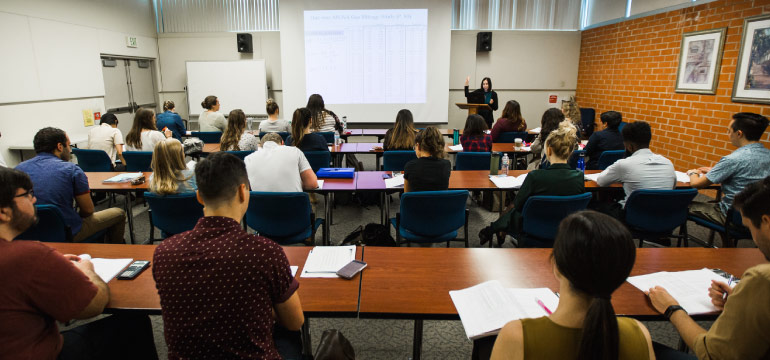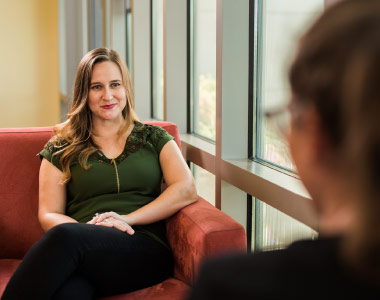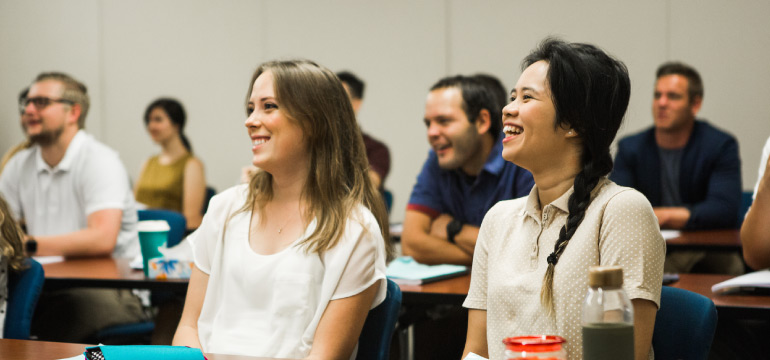Why Rosemead?
Rosemead simply has it all: in-depth psychological training, a biblical framework and an orientation to helping students grow as individuals."
Integration of Psychology and Theology
Rosemead provides you with a firm foundation of Scripture and the great historic traditions of the Christian church. We believe that Scripture provides the greatest insight into the human condition, which is why our doctoral programs include 24 credits of theology courses and integration seminars into our interdisciplinary study. These theology and integration classes, taught by faculty with psychology and theology degrees, will provide you with necessary cross-disciplinary teaching in both of these areas.

- Relevant Research & Scholarly Dialogue
Since 1973, the Rosemead-produced has been a leading source of research and scholarship on ŌĆö as well as one of the few journals dedicated to ŌĆö the integration of psychology and theology. - Integration-Focused Classes
These specialized classes are designed to enhance your understanding of how your faith and practice work together.
Our Philosophy of Integration Statement
Integration in Rosemead involves engaging psychology and Christian theology as an act of love, rooted in the belief that all truth is unified in God. We recognize that science alone cannot answer lifeŌĆÖs biggest questions; ultimately, only faith in God can provide clarity, meaning, and direction for life. By recognizing the limitations of science and the guiding influence of faith, we seek to develop a more complete understanding of realityŌĆöphysical, social, psychological, and metaphysical reality. Our approach to integration draws on the leading of the Holy Spirit through GodŌĆÖs word (special revelation) and GodŌĆÖs world (general revelation).
We believe that Integration is a culturally embedded, ongoing conversation between psychology and theology that encourages the pursuit of truth, rooted in the recognition that we are who we are meant to be only in relation to Christ and one another. Integration is a dynamic, fluid, emergent, culturally laden and continuous journey of theoretical (interdisciplinary scholarship), professional (clinical work, research, teaching, and leadership), and holistic spiritual growth (personal and corporate), whereby students and faculty seek to embody Christlikeness in their personal and professional lives. We emphasize that true knowledge comes from living in relationship with God and others, acknowledging our shared value as image-bearers of God while pursuing deeper truths that transcend human reasoning. Through this process, we seek to live fully into God's kingdom, walking humbly, loving mercy, seeking justice, and loving God and others.

Trusted APA-Accredited Instruction
Rosemead offers a high-quality APA-accredited education. YouŌĆÖll be equipped with the solid academic foundation needed to interact intelligently and serve effectively in your future career. Whether you plan to teach, research, practice, minister or counsel, you'll benefit from a number of key attributes.
- Trustworthy Name
Rosemead has held accreditation from the since 1980. U.S. News & World Report ranks 51┬▄└“ as a first-tier national university. - A Reputable Faculty
Rosemead's highly credentialed faculty has centuries of combined experience in professional clinical work, teaching, counseling and ministry. Its members have authored several seminal books over the past 30 years and are widely published in scholarly and popular journals. - Best of Both Worlds
Rosemead offers both the practitioner-based Psy.D. and the research-based Ph.D. in clinical psychology. Such training provides the best of both models and results in a scholarly synergism that is rare in the university context.
*For questions related to the programŌĆÖs accredited status, please direct to the Commission on Accreditation:
Office of Program Consultation and AccreditationAmerican Psychological Association
750 First St, NE
Washington, DC 20002-4242
Phone: (202) 336-5979 / Email: apaaccred@apa.org
Web:
Clinical Skill Development
Real-world experience is essential to your clinical skill development as a psychologist. At Rosemead, your hands-on training begins early and builds throughout your doctoral program. This training culminates in a full-time, year-long internship in your fifth year of study. All of your Rosemead training prepares you to interact with and work in the mental health community while maintaining a Christian worldview.

- Early Exposure
Rosemead operates the . Your participation at the BCC will take you beyond the classroom beginning in your first year of study. - Invaluable Internship
Rosemead's unique clinical program will give you the extensive practical experience you need to qualify for some of the nation's most competitive internship opportunities. Rosemead maintains a high placement rate in APA-approved internships. - Diverse Clinical Experiences
All students complete practicum training in a variety of settings and communities. These practicum placements provide you with opportunities to work with diverse populations ŌĆö adults, children, individuals, groups and families from various cultures and socioeconomic backgrounds ŌĆö allowing you to gain a breadth of clinical experiences in professional settings. In addition, students have opportunities to receive advanced-level training (e.g., coursework, practicum experiences) in specific areas of interest (e.g., neuropsychology, child/family therapy). - Depth-Oriented Foundation
Our faculty have expertise in a wide variety of therapeutic modalities and clinical areas. However, our foundation as a program is psychodynamic in nature. As such, there is an emphasis on depth-work woven throughout our program, and we strive to help our students grow deeper in their personal, professional, and spiritual lives. - Diverse Faculty Specialties
In addition to clinical psychologists, we also have faculty who are neuropsychologists, social psychologists, developmental psychologists, experimental psychologists, and theologians. This further enhances student learning and fosters a wide range of training experiences for our students. - Psychotherapy Lab Courses
These courses, taken concurrently with theory courses, allow you to practice under supervision in the psychotherapy modalities you are learning.

Supportive Community Environment
Student life at Rosemead is characterized by a unique supportive community. Rigorous studies and the integration of theology and psychology are key components of Rosemead's program, but your personal spiritual growth is just as important. Rosemead students join a Christian university community, providing opportunities for fellowship, dialogue and worship ŌĆö vital parts of the total developmental process.
- Personal Guidance As You Transition
Incoming students are partnered with current students to address the transitional challenges of joining a new community. - Christ-Centered Learning Environment
Rosemead offers a distinct setting where all faculty, staff and students are professing Christians. - Cohort-Model
Although there are differences in the coursework and training experiences of our doctoral programs, our PhD and PsyD students enter and progress through their programs together. We know how challenging doctoral education and training can be, and this cohort model allows for all of our students to form close relationships with each other. This has been very beneficial in helping our students sustain and thrive over the course of the program. - Fellowship Opportunities
Rosemead offers a weekly chapel for students, staff and faculty, along with other events and informal activities that are designed to enhance your spiritual formation. Spouses of Rosemead students are invited to many of these fellowship opportunities. - Focus on Personal and Professional Growth
One of the highest rated aspects of Rosemead's program by alumni is the requirement that students participate in their own personal and professional growth experiences, which include individual therapy as well as opportunities for spiritual direction, couples therapy, and group therapy.